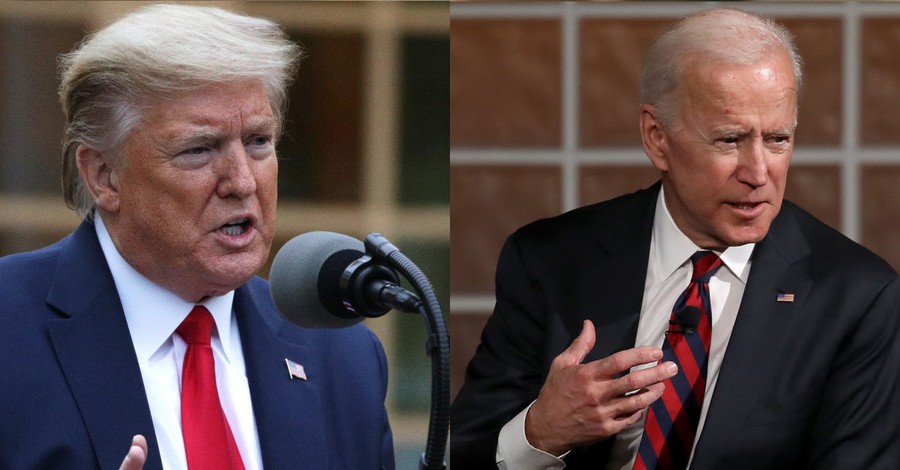
“I just can’t vote for the lesser of two evils,” said a young mom sitting across from me on my sectional sofa. Another mother chimed in, “Exactly! I can’t live with myself and vote for that man.” Then they highlighted the accomplishments of a third-party candidate who has no chance of winning but helped them sleep better at night.
I felt the same way—four years ago.
Out of seventeen candidates on a crowded republican primary stage, Donald Trump was my seventeenth choice. “He’s toast!” I said after the first debate, certain that a more dignified and experienced candidate would prevail.
I was so wrong.
One by one, the candidates fell. And Trump took center stage in a fight against someone I knew I couldn’t vote for, not as a Christian who cares deeply about religious liberty, free speech, unborn life, educational choice, effective crime reform and poverty programs, decentralized government, free market principles, border security, lower taxes, small business, U.S. manufacturing, a constitutionally sound Supreme Court and originalist judges, Israel’s sovereignty, affordable private health care, and so much more.
Could this bombastic, crass, and often immature Tweeter possibly be used by God to protect our founding principles and our faith?
I was torn.
Four years later, many Christians are still torn.
In this election, there are serious policy differences that will greatly alter the world we live in, the nation we give to our children. Three issues, however, are at a DEFCON 1 level of imminent danger for believers, for every freedom-loving American. We should consider these issues carefully before voting.
What are they?
The Electoral College
It’s ironic, really.
The party of redistribution is against the greatest purveyor of redistribution since the inception of our nation—that is the Electoral College. This body of electors prevents the tyranny of the majority, the tyranny of the metropolis, the tyranny of metropolitan morals.
How?
The Electoral College necessarily redistributes influence from the majority residing in our major cities who consume goods, to the minority in the suburbs and rural areas who create those goods. It redistributes influence to the fly-over country, the heartland. It says that those who congregate in a handful of sporadic cities cannot dominate those who work the vast majority of the land. It says that massive states cannot bully tiny states. It says that blue values cannot silence red values, and vice versa. We must work together.
It’s brilliant. Ingenious.
The Electoral College prevents the kind of tyranny seen throughout history in other nations. It counteracts the creation of another aristocracy with a peasant order. It thwarts classism by redistributing influence from the big guy to the little guy.
Thus, the irony—the party that preaches redistribution to the little guy only believes in this principle when it produces more power for themselves. If redistribution prevents their power, which is precisely what the Electoral College was intended to do, they are done with redistribution. So they are done with the Electoral College. The majority of democrats want to abolish it.
Why does this matter to the Christian?
Because religious values and concerns are easily silenced in a society without an equalizing force like the Electoral College. Couple this with the threat to make D.C. and Puerto Rico states, which will certainly have progressive representation in Congress, and our voices could be suppressed for generations. Perhaps forever.
The Bill of Rights
Individual rights are selfish—that is what the meme on my friend’s Facebook page told me. It wasn’t bluntly stated, but that was the gist of it. The praise for this radical idea was ubiquitous. The message was clear: we shouldn’t be concerned with our rights. We should be concerned with our obligations to our fellow man.
The post read like a woke greeting card. It sounds compassionate, generous, and altruistic. But it isn’t. In fact, it’s the opposite.
Rights are about the individual, and tragically individual rights have been denied to people of color, women, certain racial ethnicities and religions throughout all of human history. But in many places in the West, those rights were fought for and finally obtained. They are still denied in the Middle and Far East, and look at the results. Consider the Uyghurs in China and the Christians in Pakistan and Nigeria—these people groups are oppressed, enslaved, imprisoned, and murdered because they have no rights.
Individual rights say that even though you aren’t in my family or my tribe, I cannot take from you. I cannot harm you. I cannot cancel you. I cannot silence you. I cannot oppress you. I cannot murder you. That would be a violation of your God-given rights.
Obligations, on the other hand, are about the collective. One can argue that prioritizing our obligation is more humane and godlier than prioritizing our rights, that it is more critical to protect the collective—but without individual rights, all manner of evil can and will come to the collective by way of harm done to the individual. If you threaten the collective, like the Uyghurs do in China and Christians do in Pakistan and Nigeria, you can be oppressed. You can be imprisoned. You can be murdered—all for the “greater good.”
History is crystal clear on this point—the denial of individual rights led to the murderous regimes of Marx, Stalin, Mao, and Hitler. These atrocities were made in the name of “collective good.” They were made in the name of our obligation to others and to the state.
They were made because these nations denied rights to the individual.
Ultimately, rights protect your neighbor and yourself. They aren’t selfish. They are necessary to prevent the worst parts of history from being repeated.
So when someone has the mindset of “I have rights,” that mindset protects the rights of everyone, not just their own. This is an altruistic conviction because it puts the rights of every other individual on par with your own. This is true equality.
Scripture teaches us that concentrated power is a dangerous thing. As Christians, we must protect the rights of others by safeguarding individual liberty, and we must prevent the rise of authoritarianism which occurs when those rights are denied.
One candidate on the ballot this November has been clear about protecting individual liberty. The other candidate prioritizes the collective and has threatened to revoke many individual rights for the common good. But we cannot protect the common good by sacrificing the individual, for when we do, the common good ceases to be common. It becomes selective. It becomes elite. And the collective becomes a machine to garner power for the few at the expense of the many.
The Supreme Court
Many of our rights—religious freedom, free speech, the right to bear arms, school choice, the electoral process—are in jeopardy. Ted Cruz’s new bestseller, One Vote Away: How a Single Supreme Court Seat Can Change History, provides disturbing details of how each one of our liberties is a single Supreme Court vote from extinction.
One vote—and the rights that prevent the atrocities commonplace in other parts of the world could be gone. That single vote is on the line in this election.
Citizens put Donald Trump in office to prevent the takeover of our courts by un-elected, agenda-driven legislators wielding unlimited power in black robes. That’s why I voted for him. I was on the fence until Trump released his list of originalist judges four years ago.
Biden still refuses to release such a list. He won’t tell us who he will nominate to the SCOTUS, and that’s not all Biden refuses to say.
Kamala Harris has been clear that she is open to packing, or adding seats, to the Supreme Court to gain a majority. “Everything is on the table,” she said. Joe Biden, however, has repeatedly refused to answer when asked whether he will increase the number of Supreme Court justices in order to sway the court to the left. The Washington Post recently reported:
“Joe Biden was asked last week if voters deserved to know whether he would pack the Supreme Court, he replied, ‘No, they don’t.’ It was a stunning answer. Biden said the American people will ‘know my opinion on court-packing when the election is over’.”
In other words, voters don’t deserve to know what they are voting for until after they vote for it.
Would you hire a contractor to work on your house if he wouldn’t tell you what he was going to do to your house until after he got the job?
If you wouldn’t do that with your house, why would you do that with your country?
Under pressure, Biden gave a murky answer at his recent town hall, walking back his notion that voter’s don’t deserve to know what kind of country he will build. He said that his answer about packing the Supreme Court depends on what republicans do with the nomination of Amy Coney Barrett.
In other words, if republicans do what the voters elected them to do, democrats will change the rules to their favor. They will pack the Supreme Court. They will politicize the highest court in the land. They will destroy the judiciary.
A politicized judiciary with a packed court is a death knell for this nation.
Is this election about the lesser of two evils?
If I were on a bus hurdling toward the edge of a cliff, I wouldn’t prioritize the personality of the guy who was trying to slam on the brakes—not if the only other driver available was promising to hit the gas.
Both drivers have skeletons. Both drivers have flaws. Some of those flaws are very concerning.
But in this election, we must prioritize policies, not personalities.
One flawed candidate heads a party that is threatening to destroy the foundational pillars of our government.
Believe their threats. They mean what they say.
Their progressive policy goals cannot be achieved with the voter’s consent through the ballot box, so they must fundamentally change the foundational structure of our government. They must abolish the Electoral College. They must add senatorial seats to Congress. They must destroy the Bill of Rights. They must pack the Supreme Court.
The other flawed candidate is brash, obstinate, and boastful. But he defends the electoral process. He defends our individual liberties. He defends our judiciary. He doesn’t support the “common good,” he supports the common man and woman.
I don’t think we’re facing a “lesser of two evils” kind of vote this year. I think we’re facing a “stop the bus from plunging over the cliff” kind of vote this year. So again, I’ll vote for the Trump to take the driver’s seat, and I’ll pray that God uses him to preserve this country.
The views expressed in the commentary do not necessarily represent those of Christian Headlines.
Photo courtesy: ©Getty Images/Alex Wong/Staff, Getty Images/Win McNamee/Staff

Listen to Catherine's FREE Christian Apologetics Podcast for Parents - Christian Parent, Crazy World, available now at LifeAudio.com!











